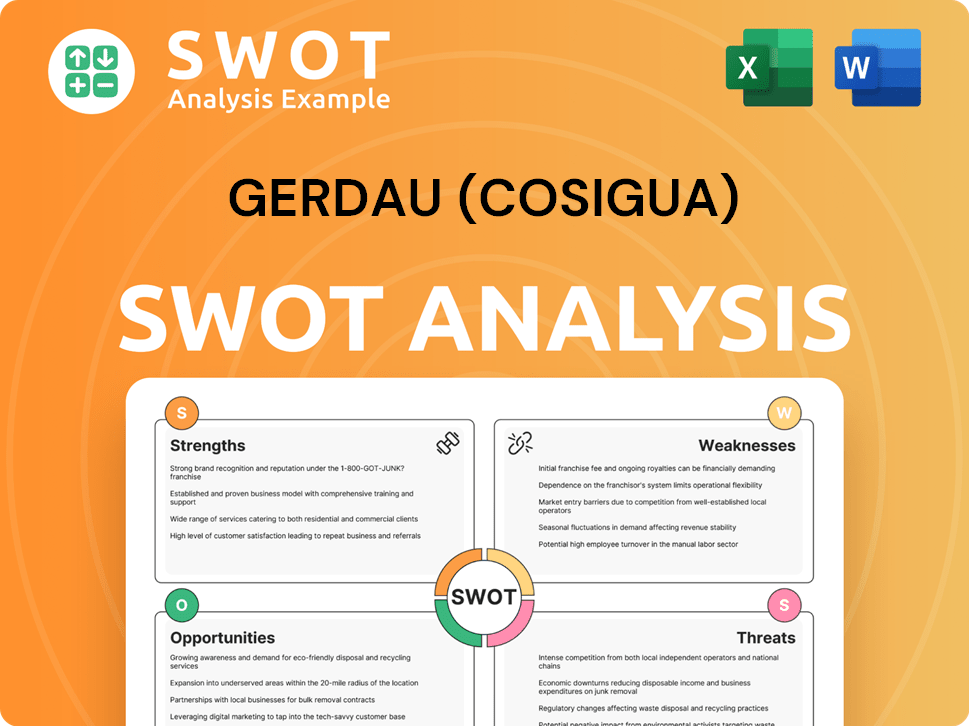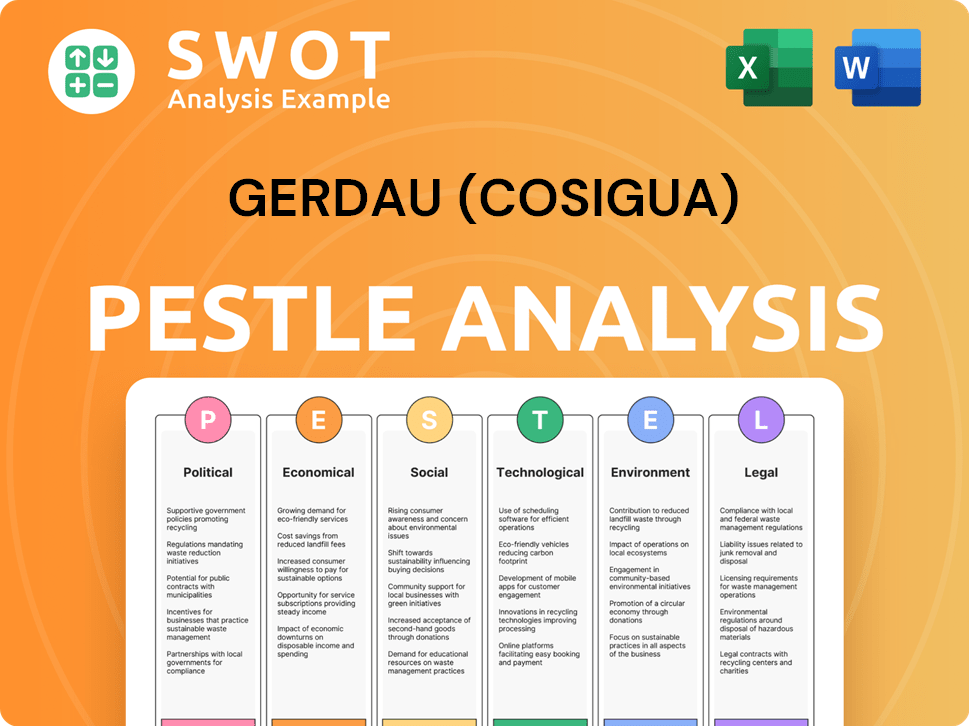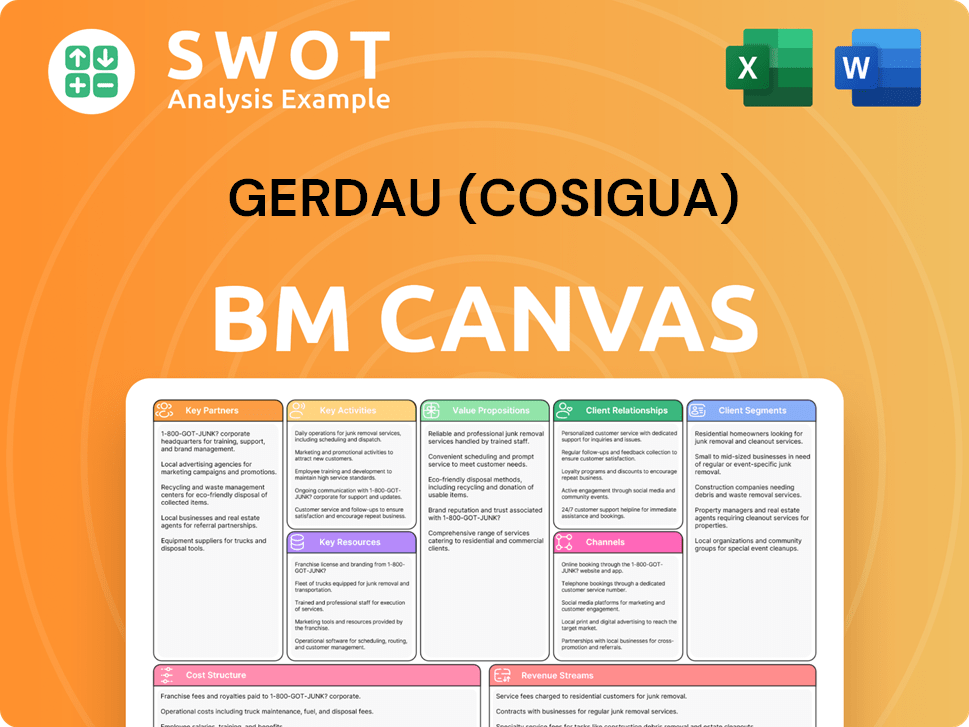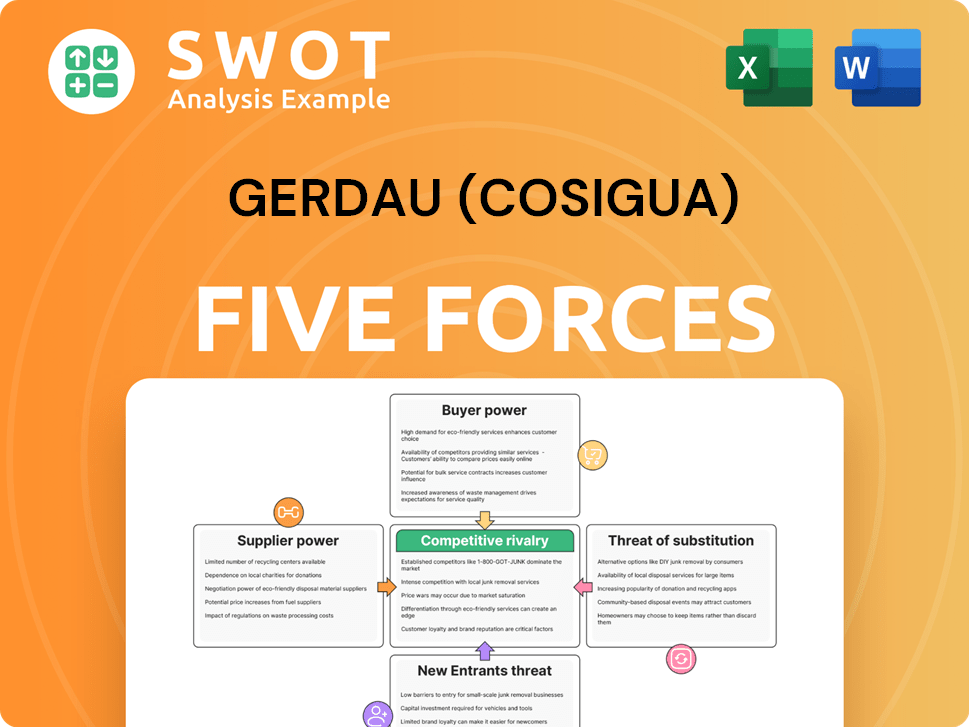Gerdau (Cosigua) Bundle
How did Gerdau Forge its Steel Empire, Including Cosigua?
Journey into the heart of the global steel industry and discover the remarkable story of Gerdau, a company that transformed from a small nail factory into a worldwide leader. This narrative unveils the pivotal role of Cosigua, a strategic move that reshaped Gerdau's trajectory and the South American steel market. From its humble beginnings in Brazil, Gerdau's expansion reflects a century of innovation and strategic foresight.

Gerdau's story is a compelling case study in resilience and strategic growth, highlighting key milestones and adaptations within the dynamic steel production landscape. Understanding the Gerdau (Cosigua) SWOT Analysis can provide deeper insights into its strategic decisions and market positioning. This exploration of the Gerdau Group, including the Cosigua company, offers valuable lessons for investors, business strategists, and anyone interested in the Brazilian steel company's evolution and its impact on the global market.
What is the Gerdau (Cosigua) Founding Story?
The story of Gerdau Cosigua begins with its founding on January 16, 1901. João Gerdau, a German immigrant, established the company in Porto Alegre, Brazil. Initially, it operated as a nail factory under the name Pontas de Paris.
João Gerdau recognized the potential in the burgeoning Brazilian market. His entrepreneurial spirit and understanding of market needs drove the creation of the factory. The company's early success laid the groundwork for its future expansion and influence in the steel industry.
The Revenue Streams & Business Model of Gerdau (Cosigua) highlights the company's evolution.
Gerdau S.A. was founded in 1901 by João Gerdau in Porto Alegre, Brazil. It started as Pontas de Paris, a nail factory.
- João Gerdau, a German immigrant, saw an opportunity in the growing Brazilian market.
- The initial business model focused on producing and distributing nails.
- The company quickly adapted and diversified its product offerings.
- The founding occurred during a period of industrialization and urban growth in Brazil.
Gerdau (Cosigua) SWOT Analysis
- Complete SWOT Breakdown
- Fully Customizable
- Editable in Excel & Word
- Professional Formatting
- Investor-Ready Format

What Drove the Early Growth of Gerdau (Cosigua)?
The early growth of the Gerdau Cosigua, a prominent Brazilian steel company, was defined by strategic expansion and product diversification. Initially known for nails, the company quickly moved into other steel products. This period was crucial for the Gerdau history, transforming it from a steel product manufacturer into a steel producer.
In 1946, a significant milestone in the Cosigua company background occurred with the acquisition of the Riograndense steel mill. This move was pivotal, allowing Gerdau to enter steel production directly. It enabled the company to control more of its supply chain, boosting its production capabilities and setting the stage for future growth.
The mid-20th century saw Gerdau expand its footprint across Brazil. The company acquired and modernized various steel plants, investing heavily in technology and infrastructure. These efforts increased output and broadened the product portfolio to include long steel products, essential for construction.
Throughout this period, the Gerdau Group maintained strong family leadership, guiding expansion efforts. By the late 20th century, Gerdau had become a dominant force in the Brazilian steel market. The market responded positively to Gerdau's growing product range, driven by Brazil's economic development and the rising demand for steel.
Gerdau Cosigua's expansion significantly impacted the Brazilian economy. The growth of the steel industry, fueled by companies like Gerdau, supported infrastructure development and job creation. This growth also contributed to Brazil's industrialization and increased its global economic presence. In recent years, the company has focused on sustainable practices, aiming to reduce its environmental footprint. In 2024, Gerdau announced investments in renewable energy projects to further its sustainability goals.
Gerdau (Cosigua) PESTLE Analysis
- Covers All 6 PESTLE Categories
- No Research Needed – Save Hours of Work
- Built by Experts, Trusted by Consultants
- Instant Download, Ready to Use
- 100% Editable, Fully Customizable

What are the key Milestones in Gerdau (Cosigua) history?
The Gerdau Cosigua history is marked by significant milestones, including substantial international expansion and technological advancements. The company's journey reflects its evolution from a regional player to a global leader in steel production, constantly adapting to market dynamics and technological changes. This Brazilian steel company has consistently aimed to strengthen its position in the global market.
| Year | Milestone |
|---|---|
| Late 1980s | Initiated international expansion, setting the stage for future growth. |
| 1990s | Accelerated international expansion with acquisitions in North and South America. |
| 2008 | Navigated the challenges of the global financial crisis, implementing cost-reduction strategies. |
| 2023 | Gerdau Group reported net sales of BRL 68.4 billion and a net income of BRL 4.9 billion. |
Gerdau has consistently embraced innovation in steel production. This has involved investing in advanced technologies to enhance efficiency and sustainability. Such innovation has helped the company to stay competitive.
Gerdau invested in electric arc furnaces, which allowed for more efficient and environmentally friendly steel production. These furnaces often utilize recycled scrap metal, contributing to sustainable practices.
Continuous investment in technological upgrades has been a key focus. This ensures Gerdau remains competitive in the global steel market.
The Cosigua company has faced several challenges, including economic downturns and global competition. The cyclical nature of the steel industry and fluctuating raw material prices have also presented hurdles.
The 2008 financial crisis required Gerdau to implement cost-reduction strategies. This helped the company manage the downturn effectively.
Increasing global competition necessitates continuous technological upgrades. Gerdau focuses on higher-value products to stay competitive.
Gerdau is committed to sustainability, aiming to reduce its carbon footprint by 50% by 2030. The company targets carbon neutrality by 2050.
Gerdau has invested in solutions to mitigate its environmental impact, responding to stricter regulations. This commitment supports long-term sustainability.
Gerdau (Cosigua) Business Model Canvas
- Complete 9-Block Business Model Canvas
- Effortlessly Communicate Your Business Strategy
- Investor-Ready BMC Format
- 100% Editable and Customizable
- Clear and Structured Layout

What is the Timeline of Key Events for Gerdau (Cosigua)?
The Gerdau Cosigua, a prominent Brazilian steel company, has a rich history marked by strategic expansions and a commitment to innovation. From its humble beginnings in Porto Alegre, Brazil, to its current status as a global player, Gerdau's journey reflects significant milestones in the steel industry. The company's evolution showcases its adaptability and foresight in navigating economic cycles and market trends.
| Year | Key Event |
|---|---|
| 1901 | Founding of Pontas de Paris (later Gerdau) in Porto Alegre, Brazil. |
| 1946 | Acquisition of Riograndense steel mill, marking Gerdau's entry into steel production. |
| 1960s-1970s | Expansion within Brazil through acquisitions and modernization of steel plants. |
| 1980s | Beginning of international expansion, with initial ventures into other South American countries. |
| 1990s | Significant international growth with acquisitions in North America (USA and Canada). |
| 2000s | Continued global expansion and focus on diversified steel products. |
| 2008 | Navigated the global financial crisis, implementing cost-reduction strategies. |
| 2010s | Increased emphasis on sustainability, recycling, and technological advancements in steel production. |
| 2020 | Responded to the challenges of the COVID-19 pandemic, ensuring operational continuity. |
| 2023 | Announced a target to reduce its carbon footprint by 50% by 2030 and achieve carbon neutrality by 2050. |
| 2024 | Continued focus on digital transformation and innovation in steel production, with strategic investments in new technologies. |
Gerdau is heavily invested in sustainability, aiming to reduce its carbon footprint. The company plans to achieve carbon neutrality by 2050. Gerdau is investing in renewable energy sources to power its operations, aligning with global trends toward greener manufacturing processes.
The company is focused on expanding its presence in key growth markets. This includes a strategic focus on high-value-added steel products. Gerdau's growth strategy involves leveraging its existing global footprint and adapting to the evolving demands of the steel market.
Gerdau continues to invest in digital transformation and innovative steel production technologies. This includes the implementation of advanced manufacturing processes. These investments are aimed at improving efficiency and reducing environmental impact.
The global steel market is expected to see continued growth, particularly in recycled and low-carbon steel. Decarbonization efforts and the increasing demand for sustainable materials will significantly impact Gerdau's future. Analysts predict that the company is well-positioned to capitalize on these trends.
Gerdau (Cosigua) Porter's Five Forces Analysis
- Covers All 5 Competitive Forces in Detail
- Structured for Consultants, Students, and Founders
- 100% Editable in Microsoft Word & Excel
- Instant Digital Download – Use Immediately
- Compatible with Mac & PC – Fully Unlocked

Related Blogs
- What is Competitive Landscape of Gerdau (Cosigua) Company?
- What is Growth Strategy and Future Prospects of Gerdau (Cosigua) Company?
- How Does Gerdau (Cosigua) Company Work?
- What is Sales and Marketing Strategy of Gerdau (Cosigua) Company?
- What is Brief History of Gerdau (Cosigua) Company?
- Who Owns Gerdau (Cosigua) Company?
- What is Customer Demographics and Target Market of Gerdau (Cosigua) Company?
Disclaimer
All information, articles, and product details provided on this website are for general informational and educational purposes only. We do not claim any ownership over, nor do we intend to infringe upon, any trademarks, copyrights, logos, brand names, or other intellectual property mentioned or depicted on this site. Such intellectual property remains the property of its respective owners, and any references here are made solely for identification or informational purposes, without implying any affiliation, endorsement, or partnership.
We make no representations or warranties, express or implied, regarding the accuracy, completeness, or suitability of any content or products presented. Nothing on this website should be construed as legal, tax, investment, financial, medical, or other professional advice. In addition, no part of this site—including articles or product references—constitutes a solicitation, recommendation, endorsement, advertisement, or offer to buy or sell any securities, franchises, or other financial instruments, particularly in jurisdictions where such activity would be unlawful.
All content is of a general nature and may not address the specific circumstances of any individual or entity. It is not a substitute for professional advice or services. Any actions you take based on the information provided here are strictly at your own risk. You accept full responsibility for any decisions or outcomes arising from your use of this website and agree to release us from any liability in connection with your use of, or reliance upon, the content or products found herein.